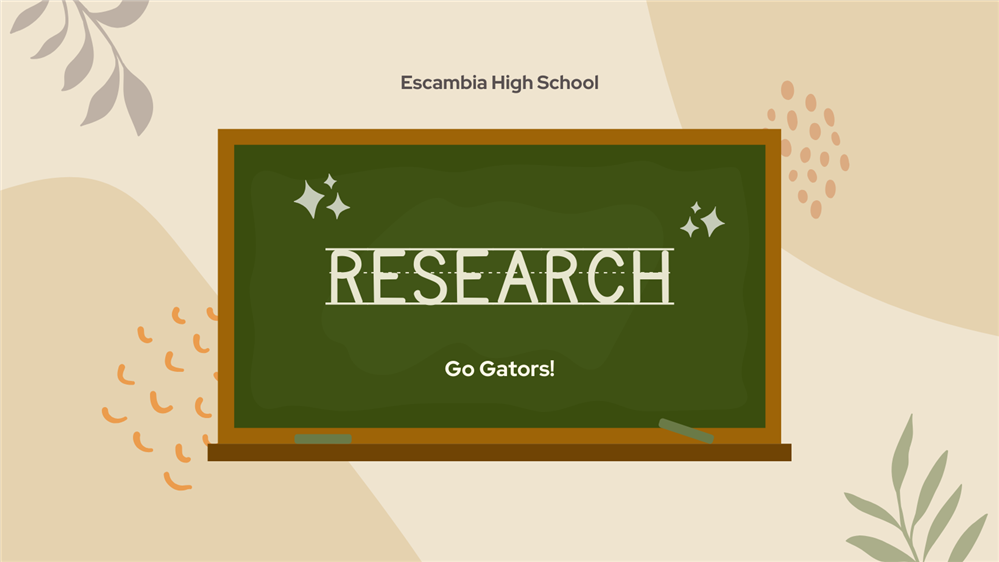- Escambia High School
- Research Help
Research Help

-
This is your one-stop shop for all things research related. If there is something you would like to see addressed here that is missing, please send me an email and I will see what I can do to help you. In the meantime, keep checking back to see what I find that will help you do your very best!
Why Databases?
-
When I teach a research class, one question I always ask is what does a source look like? Where can you find it?
This is always a great question to ask yourself. The first answer I often get is "Google!" Sure, you can certainly use Google to find sources for information, but there's an element of uncertainty that comes with using a search engine. Anyone can make a website look and sound professional. I myself know absolutely nothing about fixing motorcycles, but if I was so inclined, I could make a website on how to do just that. I could do it fairly quickly and make it look and sound knowledgeable. Would you want to take my advice? You shouldn't, at least not on that topic.
Databases solve this problem for you. Databases are structured and curated by academics who verify the validity of the sources they offer. Have you ever heard the phrase, you get what you pay for? Google is free, and while we love free, in this case free might not always be the best. Databases are expensive. I mean, expensive. Part of the reason is because there is so much work on the back end that goes into making sure the sources they are providing you are credible. The good news is, databases are paid for by the institutions that provide them. You, as a student or patron, won't pay anything for access. So databases are free for you.
There are so many websites that provide incorrect information, some out of a lack of knowledge, some out of misunderstandings, and some do this on purpose. Much of the time, a website's goal isn't to provide you with quality, accurate information, it's to make money. They don't care whether you believe them or not, if you click on their page they are generating ad revenue. Databases earn money by providing you with high quality and accurate information.
So how can you access databases? ECPS provides some for you. They can be found on the Core App Dashboard. Scroll down to High School Student Resources and select Gale High Online Resources. There will be a selection of databases. I always recommend starting with "Academic Onefile", but you can start with whatever database you prefer. If you are asked for a login, please ask your teacher or the librarian. We can get that information for you.
Citations
-
It used to be that when you needed to make a citation, you would go grab a handbook, make sure all the punctuation was correct, that you'd italicised in the right places, and that everything was in the exact right order. If you are a perfectionist, this is a very stressful endeavor.
Now you can use a citation generator, like EasyBib or CitationMachine. These allow you to pick your preferred format (you don't want to give your teacher MLA citations if they've asked for APA) and it will generate your whole citation for you. You can even create folders to save all your citations for one project and you'll be able to come back to them later.
If you are using a database, most of these have citations right there ready to go at the click of a button. All you have to do is copy and paste.
This is such a time saver and it really takes the pressure off making sure you do everything exactly right, giving you more time to do the actual research and discovery part of learning. I encourage all students to take full advantage of these.
Classics Online
-
Did you know that after a certain amount of time, books transfer into the public domain? Here's a great breakdown on what exactly that means, but the gist of it is, any book published before January 1, 1926 is now in the public domain. This is good information for you to know because it means you can now read that book online for free.
Books that are in the public domain often include classics you might read for a class. Examples include, but are certainly not limited to, The Odyssey, The Great Gatsby, A Tale of Two Cities, Pride and Prejudice, 20,000 Leagues Under the Sea, Don Quixote, or even Alice's Adventures in Wonderland.
Be careful to make sure what you are reading is really free. Kindle charges nominal amounts for some of these titles. It's usually around $.99, although I saw one as low as $.30. The paid options are usually the first results so if you're searching Amazon, keep scrolling and you'll likely find a free option. An alternative would be to search "Book Title free" if you are set on having a Kindle copy.
Some excellent alternatives include websites like Project Gutenburg, Internet Archive, Google Books, Library of Congress, Open Library, and Classic Literature Library. And as an added bonus, LibriVox has free public domain audiobooks.
So the next time you are in the mood to read a classic and don't want to spend the cash, keep in mind that there are many excellent alternatives for reading classics for free.

